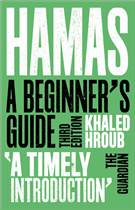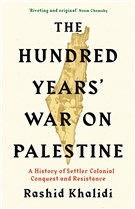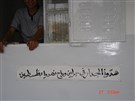Where the young Palestinian Ismail Hroub was killed and buried after being recruited by the Ottoman army in the early twentieth century remains unknown. His brother, my paternal grandfather Khalil Hroub, would for the rest of his days remain saddened by the early loss of his brother. He had refused any money from the Ottoman administration, then based in Hebron, as compensation for this loss. Like many Palestinian families who lost young men in the Great War, and despite sheer poverty and need, my grandfather considered it undignified to accept compensation. Their position was not affected by the fact that Ismail had, along with dozens of the “fittest” young men from our village, Wadi Foukeen, and the surrounding villages of southwest Bethlehem, been forcibly recruited by the brutal Turks who ruled most of the Eastern Mediterranean until the collapse of Ottoman rule and the coming of British and French colonialism.
Ismail was a wonderful, good-looking, tall, and strong man. The best in the village – or so my grandfather used to say. His story, with the tragic ending of premature death, evolved in the collective memory of our family and was coloured in pride, myth, and mystery. Subsequent generations of the family believed him to be our greatest contribution to that desperate war and to the doomed destiny awaiting the Ottoman Empire.
My childhood memories are filled with the accounts my paternal grandfather, Khalil, never ceased relating about his brother Ismail’s war heroism. To his very last days (he died in Amman in the late 1980s) Khalil was incapable of holding back tears when talking with pride about the greatness of his venerated brother, a greatness that matched that of the waning empire he imagined to be defending. The stories were never-ending. Every time Khalil re-told one about Ismail, new fragments were added; a blend of fiction, reality, and anticipation, filling many holes in the ever expanding account, and sometimes creating new ones. As Khalil aged, these holes became more in number, wider in size, and harder to fill. No longer children who believed grandfather’s talk indisputable we, his adult offspring, would pass each other covert, knowing winks, before bestowing ever more loving hugs on our ailing, emotional, and most-beloved grandfather.
The only part of Khalil’s accounts about the heroism of Ismail that never changed concerned the latter’s magnificent fighting in the Dardanelles against the British. Since my very youngest years, that musical name, “Dar..da neelz”, has resonated in my mind because it was so often repeated by my grandfather. At the time neither I, nor any of my many siblings and cousins knew what “Dardanelles” was, and whether it was a person’s name, a country, or even a fruit. Yet, over time we came to know that it is a very important place in Turkey that the Allied armies repeatedly attempted but failed to conquer. They were defeated because it was their bad luck to be confronted by our Ismail who, according to Grandfather Khalil, bestrode a terrifying gun, called a “miter ell louz,” that annihilated them. Using that all-devouring weapon, Ismail managed to destroy the armies of the Allied countries, battalion by battalion, thus keeping the Dardanelles free from foreign troops, and consequently keeping Istanbul and Turkey from falling into the hands of the invaders. During high school, my friends who had also heard all the same stories from Khalil all their lives, grew increasingly sarcastic of my grandfather and invented a nickname for him: “The Protector of Turkey,” Hami Turkiyya. Thus, they would mockingly describe my paternal grandfather and his brother, deliberately confusing the two.
In later years, I read scattered fragments about the siege and battle of the Dardanelles; a battle that brought a then low-ranking military officer, Mustapha Kamal (or Atatürk, as he would later be named), still in his early 30s, to the very gates of glory. The battle stretched over several months, and is known better by its more famous name, “Gallipoli.” Gallipoli was an impressive example of military genius at its best, later to be taught at war colleges across the divide for what it showed in steadfastness, sacrifice, clever manoeuvrability, and ruthlessly determined leadership. Together, these qualities enabled the Turks to counter-attack the massive military might of the Allied navies, and to do so despite inferior weapons and numbers. Almost all the credit goes to Mustapha Kamal’s bravery and astonishing military skills, which laid waste to Churchill’s attempt to encircle Turkey from the West. The plan undertaken by the Commonwealth countries was to exert enormous military pressure, through heavy naval firepower, on the soft, narrow straits of the Dardanelles. Their fall would enable the Allied navy to break into the Sea of Marmara, thus forcing the waters wide open and exposing all Turkish coastal defences on the West. Had the Allies succeeded, Istanbul would have become the Allied prize, leaving the Ottoman Sultan with no option but surrender.
Recently, I came across more details about that battle and that period in Austin Bey’s fascinating and enjoyable Ataturk: Lessons in Leadership from the Greatest General of the Ottoman Empire (2011). In reading this lucid text, all the stories of my “great” great-uncle who “protected Turkey” with his “miter ell louz” came back to me. Detailing the battle of Gallipoli, Bey mentions that along with Mustapha Kamal, there was an Arab battalion that fought with the utmost courage for many weeks on the steep hills of that peninsula, and that it did so in the harshest of winter conditions. It was there that most of these Arabs were killed, but there is no trace of where they were buried. Thus, Ismail, my grandfather’s brother, and representative of the Hroub family, had defended the Ottoman Empire. He most likely fought there with many other Palestinian comrades who, most likely again, came from the same neighbouring Bethlehem villages.
Long before his dispatch to the Dardanelles and his assumption of leadership in this famous battle, Mustapha Kamal (Atatürk) had impressed his superiors from military high school all the way through war college. In Gallipoli, he had to confront a vast Allied naval fleet that surrounded the small peninsula along the Dardanelles and continuously bombarded the small Turkish force charged with defending the coastal territory. At one crucial moment in those long, cold, rainy, and bitter weeks, the Allied troops launched a massive attack on the peninsula, intending to be unstoppable until full occupation and control was achieved. As an immediate result of this charge, many soldiers in the Turkish force abandoned their coastal defence lines and retreated to the mountainous peninsula. Bey details how this Turkish retreat from the massive attack indicated that the long steadfast defence of the peninsula had finally started to collapse. At that very crucial moment, the frightened and fatigued Turkish soldiers who were running up the hillsides of the peninsula, were stopped by Atatürk, who, standing in their way, screamed into their faces his most famous military order: “I do not expect you to attack, I order you to die. In the time that passes until we die, other troops and commanders can come forward and take our places.”
This bone-chilling and historic command in the face of retreating soldiers best explains, as I like to believe, part of my grandfather’s story which has remained baffling over the years. As often told by his brother Khalil, Ismail, “The Protector of Turkey,” was seriously injured during the Dardanelles battle. Because of his injury, he was offered a return home to his village in Palestine, but refused. He asked to be treated in the rear lines, then to be brought back to the front immediately once he was able. In fact, and according to our grandfather, Ismail insisted that he wanted to go back to the very same trench where he was injured. How did this illiterate young villager become so deeply inspired and determined to fight in a battle that he knew very little about? What was it about that heroic Atatürk speech ordering my great-uncle and his fellow soldiers to die with dignity and honour that so lifted their morale and inspired them to fight with such spirit in their hearts? Atatürk himself was no less high-spirited and determined. Bey mentions that the great leader was also injured, with shrapnel in his chest, during Gallipoli, but that he hid this from his soldiers to keep their spirit and morale high.
I leave my grandfather and great-uncle in peace for a bit and turn to Atatürk for a closer look. It is so interesting to observe the sharp contrast between the backwardness of most aspects of the then declining Ottoman Empire, and the progressive and professional nature of the military circles where Atatürk was trained and educated. In the last few decades of the empire, when decline was seen to be imminent, Istanbul desperately sought to avoid its destiny. The best-known effort was the “Tanzimat,” a wide-ranging process of modernisation and adoption of Western models in public administration, politics, and education. Generally speaking, it failed to heal the deep-rooted decadence of the empire. The only exception, however, seems to have been relative success in the military sector, particularly in establishing military schools and war colleges along the line of European models. These military institutions created a generation of young and highly trained and educated Turks, among them Atatürk.
Atatürk’s educational and military modernisation had in fact made of him a unique leader, in war and politics alike. He fought astonishingly well at successive fronts, against the Allied troops in the West, against the Greeks who surrounded Izmir, and against the Russians in the East. At the same time, he clearly realised that “his” war was against Western imperialism, and not Western modernity. He believed in modern Western models in polity, science, and knowledge, and wanted to adopt those and integrate them into Turkish society. These were for him indispensable prerequisites for attaining a powerful and truly independent Turkey. In his wars that took him along the falling boundaries of the other Ottoman territories, weak Sultans in Istanbul were busy making humiliating concession after concession to the Western powers, resulting in the actual dismemberment of the Ottoman territory. If these concessions started with the 1903 Mürzsteg Reform Programme, where international monitors supervised a Turkish police force in Macedonia, they did not end with the 1920 Treaty of Sèvres, which effectively compelled the Sultan in Istanbul to endorse the formal dismemberment of his empire.
The relevant point here is that the sophisticated education Atatürk had been lucky to acquire enabled him to assume the role that he played in future years. Starting from high school and through the military colleges, Atatürk read philosophy, politics, and literature. He read Rousseau, Voltaire, and Comte. He also learned and spoke French. All this gave Atatürk access to knowledge, and enabled him to develop a vision where he could perceive a place for modern Turkey along with the means it should adopt to maintain territorial integrity and a bright future in the post-empire, post-war, era. It was Atatürk’s far-sighted vision that led Turkey to emerge from those turbulent times intact and modern. If matters were left to the outdated and traditional thinking of the ruling elite in Istanbul, with their petty squabbles and lust for power at any cost, the Turkey we know today would not exist.
I now return to my grandfather, Khalil. In Atatürk’s time, he and his peers in our village and other parts of Palestine were living a comparatively pre-modern life, oblivious of the dangers increasingly looming over their own homeland. They proudly thought of their brothers as soldiers in the service of the Sultan in Istanbul and his Islamic Caliphate. It was completely alien to their simplistic thinking to imagine that the Sultan was in fact allying himself with the British and other European powers against Atatürk, who led the war for Turkish independence. The dichotomy of modernity/tradition that Turkey had been witnessing was also manifested in Palestine in a more vicious fashion. In Turkey, the battle was ultimately fought between contending native Turkish forces. The case in Palestine was, however, a replica of modern and advanced foreign colonials overrunning traditional and backward communities and structures. The European Jewish immigrants who flooded Palestine and immediately set up their own organisations, under the protection of the British Mandate of Palestine, enjoyed the highest levels of modern knowledge and training. Not only was this knowledge more powerful and modern in comparison to that of the Palestinians in terms of science and education, but even more usefully, in comprehending international affairs. It was setting the course that history was hatching in the world and in the region, and thus the politics and alliances one would consequently follow. The war for Palestine in the first half of the twentieth century can therefore be seen as a battle between rising modernity and declining tradition.
My grandfather and his generation lost Palestine. The only consolation for him, perhaps, was that his brother, Ismail, served under the leadership of Atatürk in defending the Dardanelles Straits at the famous battle of Gallipoli. Turkey was preserved, united, and integral. One disheartening perception that evolved within the generations that followed my grandfather’s is that the deep and bitter lesson of the Ottomans versus Atatürk was not learnt. The insightful, fascinating, and enriching experience of Atatürk would be reduced, in a public discourse shaped and advocated by “modern” Islamists, to nothing more than an imperial conspiracy to end the Caliphate: a Caliphate that was already crumbling, and did not need someone like Ataturk to end it, or someone like Ismail to defend it.
[This is an edited version of an article that originally appeared in Jerusalem Quarterly.]
![[Mustafa Kemal Atatürk with King Edward VIII.]](https://kms.jadaliyya.com/Images/357x383xo/King_Edward_VIII_and_Mustafa_Kemal.jpg)










